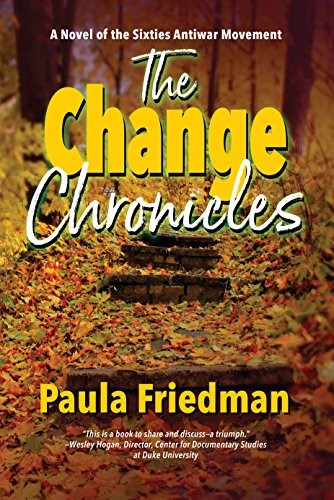
This book is dripping with realism, with historic realities, stuffed full of the issues of the then still young baby-boomer generation. We are immersed, near drowning, in the real issues of a student body that feared the bomb: but feared man’s inhumanity to man far more. We are with the issues of the post-war generation that had to make stark individual choices between defying the generally respected government apparatus of their parents and grandparents, by radically opposing neo-colonial war, or joining the ranks of those that might have to kill as soldiers, or certainly by proxy, those fighting for their homes and their innocent children in distant lands.
As the body-bags and damaged young men, returned from the war in ever greater numbers a social divide split Berkeley, this read’s setting, then West-Coast America, and eventually the ‘free world’. Additionally, the boomer generation were deep in the already progressing struggle against racism and, as the ‘60s progressed, the drive towards sexual equality was gaining a long-dormant momentum. A tsunami of social consciousness grew out of the student Free Speech Movement, the roots of the 60s Counterculture, and swelled out so far and so deep that even today we feel its dissipated pull. Culture has seen fundamental change, despite recent pressures to reset the clocks of history from many right of centre and ‘religious’ groups.
Nora is at the centre of the social struggle, a child of the ‘50s, a daughter of parent’s born in the ‘20s and ‘30s. The older generation that had suffered the deprivations and often the full horrors of world war and who now struggled to understand the anti-establishmentarianism of so many of their kids. In 1966, the parental generation was as psychologically distant from the lives of their children as any times have seen. But quite naturally, establishment structure and deeply ingrained cultural expectations, hung heavy shadows over even the most progressive. No generation can reject all the expectations of their upbringing. Nora, like those around her, was struggling with her personal place in the world as much as with grand designs. This is so vividly drawn in this story as the young unmarried mother feels little choice but to give up her new-born child. This is a chronicle of change for one women in a social fabric that was constantly melting and reforming around her.
Friedman’s brilliant writing lets us see how the new sexual permissiveness of late ‘60s youth is overshadowed by old moralities. For example, we see how many men were all-too-ready to enjoy new sexual freedoms but without accepting the fullness of accrued responsibility. We see the young women, who are equally driven by new social permissiveness, but are so often left abandoned to face single parenthood, still then illegal abortion, or cruel adoption. The pill, though a birth control reality from 1960 onwards, was still years away from available to all but a few women; or in many territories and especially among their many religious and cultural groups, any women whatsoever. The 1960s were more about changed expectations than the progress that decade unleashed, just as previous history had paved the groundwork for racial equality, and the ‘70s would soon for the rainbow of sexuality.
Friedman draws us through every significant thought and fear, not just of the principle character, Nora, but her whole generation of educated, informed, and variably enlightened young activists. She represents a post-war generation that was desperate to change society, rather than just their own fortunes. As always, change brought mixed and shifting actions and conflicting opinions even between those that held aloft the very same flags. This is a book that in an equal universe should find a place as the ‘lighter’ but equally socially enlightening read, complementing iconic works from Weinberg, Ginsberg and so many well-recognised others. This book should be on the shelves, available to all those that seek insight into the social tapestry behind songs of Dylan, Baez and Lennon and so many more. This book is so much part of the essential history of those in my wide generation that fought with the banner, the guitar and the pen, and with the desperate but sadly naive conviction that the world could be made better for all, not just those blessed by God to have the most money and the most destructive guns. Of course, as in all generations the baby-boomers fill all areas of the political spectrum, though for a time there was promise of us really being something different; a truly progressive generation. So incidentally, it’s feels so sadly poignant that our now senior, empowered generation, is making such a mess of its responsibilities to humanity and this planet. But despite abject failings those that marched can at least find some relief in the social earthquake that is still shaking out new and profound chronicles of hopefully sustainable change, across so much of the Earth. Despite everything, the wind of change that blew from Berkeley in the ‘60s has left an indelible footprint on social history, and Friedman’s book gives us a glimpse into the countercultural foundations of our changing social fabric. I feel so fortified when reading Friedman’s deeply woven commentary on the early determined stands of so many of our post-war generation. This goes some small way towards alleviating the sense of shame brought on so many of us by the actions of the aging boomer leadership, which conspires to reverse so very much of what Friedman and her contemporaries achieved. Sad though many aspects of this book are the overall feel is one of positivity, a banner flown for the progressive spirit.
This is quality writing that lets one breath in the winds of change that may have lost its acute direction, but whose influence is felt in so many aspects of the world today, including currently in hashtag metoo, in the wider struggles for social justice, human rights and for our basic freedom of speech. We have hopefully passed onto our children enough social conscience to bring down the new savage capitalism and currently growing fascist tendencies. This is a book about some of the ordinary voices in an extraordinary movement, in the chronicles of change. This read is an intimate look behind the placards and politics of a generation that once dared to march, not for themselves, but for a better world.

 Log in with Facebook
Log in with Facebook 







